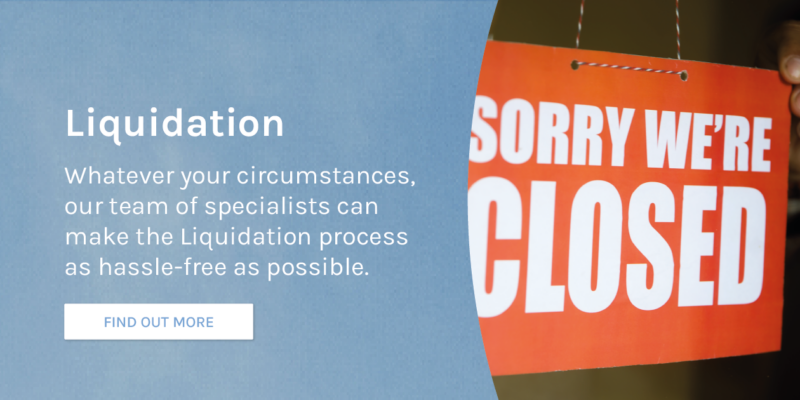While it might be common knowledge to have an understanding of what happens to a business entering into liquidation, or even a director once it has folded, not many will understand what happens to a director of a company during liquidation.
Liquidation is a highly complicated time for all parties involved, from the staff and customers/clients, to suppliers and creditors, to the directors.
If you aren’t careful, insolvency can feel like it’s come out of nowhere. Even seemingly the most successful companies can slip into insolvency if enough red flags are ignored.
If you’re the director of a business, it’s vital that you get ahead of any potential issues and stay protected. Should your financial situation worsens, it’s important to understand exactly what the consequences could be for you throughout — are you conscious of what scenarios could lead you to being liable? Find out more today.
Why Is Liquidity Important To a Business?
Liquidity is a surefire sign of a business’s financial health and the effectiveness of its operation and company strategy and management. It ensures that the business is able to meet all short-term obligations (suppliers, wages, bills, etc.) and therefore is able to adequately maintain operation without worry.
A company operating with good levels of liquidity will be in a strong position to react should anything unexpected go wrong, or if an opportunity or new market/industry trend were to present itself.
A business facing issues with liquidity can, if the situation is allowed to unravel to a significant degree, find itself in danger of liquidation. If your company enters into liquidation, it means that it is in the process of being shut down. If financial obligations cannot be met, company assets will be sold in order to repay all creditors. 
There are two primary methods of liquidation, solvent and insolvent liquidation:
- Solvent liquidation: This form of liquidation occurs when a company director/directors voluntarily opt to close their business. This is particularly common in the event of director retirement, or if the company is deemed to no longer be useful. This is referred to as a Members Voluntary Liquidation (MVL)
- Insolvent liquidation: Insolvent liquidation takes place when a firm is not able to continue with its operation for financial reasons. The purpose of this type of liquidation is to repay as many of the business’s creditors as much as possible.
If you are the owner/an owner of a business, it’s vital that you know the liquidity status of your business at all times. Understanding whether your business is capable of paying all of its bills and ensuring it can have a stable future is of the utmost importance.
What Does Insolvency Mean for a Director?
Generally, what insolvency means for a director is that they will effectively lose their standing and position within the company. They are no longer able to act in any way on behalf of the business, nor do they have control over the business or its assets.
During insolvency, the courts will appoint an Official Receiver (OR). This person will be responsible for the entire liquidation process. During this time, the company directors are required to cooperate with the OR, to provide any information necessary for the insolvency process.
In addition to facilitating the liquidation process, official receivers are also responsible for conducting any investigations into the actions and conduct of the company directors prior to insolvency that they see fit.
If directors are found to have not acted reasonably and responsibly leading up to the company’s insolvency, it is possible that they could be sanctioned. Potential sanctions could include:
- You can be banned from acting as a director for between 2-15 years
- You may be fined
- In particularly serious situations, the director could face legal sanctions, including prison time
- In some circumstances you could be found personally liable
The responsibilities of a director in the build up to, and upon entering liquidation, should always be to the firm’s shareholders, employees, and debtors. Failure to act to the benefit of these groups could result in any of the aforementioned sanctions.
When Are Directors Liable if a Company Goes into Liquidation?
Due to ‘the veil of incorporation’ directors are not likely to be liable if their company goes into liquidation. This typically only applies to directors of limited companies. The debts of sole traders are expected to be repaid from personal funds because the business’s operations and the finances of both owner and company are seen as indistinguishable from one another.
However, there are certain instances where directors will not be protected and may find themselves exposed to the threat of personal liability. This includes:
- The director provided a personal guarantee for a loan
- Company directors are seen to have committed wrongful or fraudulent trading
- A director is found to be guilty of misfeasance
- Personal liable is stated in the prior-agreed shareholders agreement
- The directors loan account is overdrawn
Can You be a Director of a Company After Liquidation?
Generally, a director should be able to continue to act as a company director even after their business has entered into and been liquidated — as long as there has been no evidence of serious wrongdoing, such as misfeasance or fraudulent trading.
However, it should be noted that there are some restrictions to this. For example, if you have been the director of a liquidated company, and you set up a new company, it cannot have the same or a similar name to the old business. This is done to minimise confusion for any remaining creditors of this now liquidated company.
The practice of starting a new business with the same, or a similar name is referred to under Section 216 Insolvency Act 1986 as ‘passing off’. Being guilty of passing off can result in criminal action against the director or being held liable for the debts of the new company should it enter into liquidation.
It should be noted that if you are particularly attached to the name of your old business, it may be possible to purchase it for use in your new company. However, this can often be a difficult sell so is not always possible.
Additionally, if HMRC were owed a large sum when you entered liquidation, it is possible that they may insist on a PAYE or VAT deposit in order to protect their position should circumstances repeat.
Should you ever be disqualified as director of a company due to wrongful or fraudulent trading or acting unlawfully prior to your business entering into liquidation, while you are no longer able to be a director of a company, you can be a shareholder.
Support with You in Mind
If your company goes into liquidation, do you fear that it may affect your future, or are you considering your options with one eye on retirement? No matter your circumstances, it’s important to gain full understanding of what happens to a director of a company during liquidation to ensure that you remain protected against any eventuality.
Our dedicated team of insolvency experts possess decades of experience and have supported directors of companies of all industries, shapes, and sizes in the face of liquidation. We can help you close down your company in the most efficient, secure manner.
Inquesta understands that your business is unique — what works for one company does not necessarily work for the next. That is why we promise to always conduct a thorough and detailed investigation into all facets of your company, to ensure that we have as clear an understanding of your circumstances as possible. This is what allows us to promise that we can provide an all-encompassing service designed to guide you to the best possible conclusion.
In addition to our work helping company directors during liquidation, we offer a variety of insolvency services. This includes, but is not limited to, services surrounding:
- Administration
- Business Recovery
- Liquidation
- Solvent winding up
- Bounce back loans
- Company Voluntary Arrangements
For additional information about how Inquesta can support you with the liquidation of your business, get in touch today or request a free no-obligation consultation.


